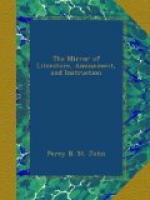The Family Library Editor has judiciously enough filled his 20th volume with “Sketches” from the History of Venice. Another volume is promised, the present extending from the settlement of the Veneti in Italy to the year 1406. The intention is stated to be, “to present in detail some of the most striking incidents of the History of this great Republic, connecting them with each other by a brief and rapid survey of minor events;” for which purpose the Editor has freely taxed Sismondi and the late Count Daru. The result is one of the most enchanting volumes of historiettes that has ever fallen into our hands; illustrating, to be sure, numberless dark points, or “damned spots” of human history; “much of atrocious guilt, of oppression, cruelty, fraud, treachery, baseness, and ingratitude;” yet the very heinousness of these characteristics carries on and keeps up the intense interest of the volume.
We select for extract the “tragical tragedy” of Marino Faliero—not so much for its novelty to the reader, as for correcting an erroneous view into which the license of poetry may have led him:—
The name of Marino Faliero is familiar to English ears; but the reader who borrows his conception of the Doge of Venice from the modern drama in our language which purports to relate his story, will wander as far from historic truth as from nature and probability. The Chronicle of Sanuto, which the poet has avowed to be his basis, presents no trace of that false, overwrought, and unintelligible passion which, in the tragedy, is palmed upon us for nice sensitiveness to injured honour. We are told, indeed, that the angry old man had once so far indulged his choleric humour as to fell to the ground a somewhat tardy bishop during the celebration of a holy solemnity. We hear of a fiery temper, accustomed to command, elated by success, and in which, on the confession of Petrarch, who was personally well informed regarding it, valour predominated over prudence. These are the unsettled elements upon which the Tempter best loves to work; but the insanity and extravagance with which we must charge Faliero, if we suppose his attempt to overthrow the government of which he was chief, arose solely from an outrageous desire of revenge for a petty insult, are entirely gratuitous, and belong altogether to the poet. Madness of another kind, however, that of ambition, is clearly ascribable to him; and, if we take this as our key, much of the obscurity attendant upon a catastrophe which has been imperfectly and inadequately developed will be cleared away; we shall obtain a character little indeed awakening our sympathy, but yet not wholly at variance with our judgment; and although we may be astonished at, and recoil from the motives which prompted his crime, they will not be altogether of a class which sets our comprehension at defiance.[6]




